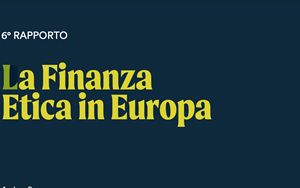(Finance) – Generating, through their activities and investments, 5 percent of the Union’s GDP, the 22 European ethical banks are more profitable than the main European banking giants, more solid, and more consistent with the strategic choices declared and actually persecute. This is what emerges from sixth report “Ethical finance in Europe” which compared them with 60 “significant” conventional institutions – i.e. with assets exceeding 30 billion and directly supervised by the European Central Bank; that is, those that are also considered as the “big to fail” – in terms of profitability, capital adequacy and financial performance considering the ten years from 2011 to 2021. Presented in Milan, the Report is the result of the work of international research resulting from collaboration between Ethical Finance Foundation, Fundación Finanzas Éticas and European Federation of Ethical and Alternative Banks (FEBEA).
The study shows that European ethical banks record a return on equity (ROE) of 5.23%, against 2.21% of conventional banks. An advantage that is also noted for the return on assets (ROA), which rewarded ethical banks with an average of 0.46% compared to 0.25% for conventional banks. The data gives substance to a positive structural distinctiveness of ethical banks, considering that it has established itself over a decade of surveys, also including the year 2020, when both ethical banks and traditional institutions were suffering the blows of the pandemic crisis. The differences are also recorded in other management items, showing not only opposing vocations and approaches, but also demonstrating that the “ethical” alternative in the pursuit of profit of the banking company is possible, virtuous, solid and coherent, starting from the centrality of the exercise of the credit activity itself.
The credit in fact, it remains by far the main activity for ethical banks: in 2021 it is equal to 65.4% of total assets, against the 50.8% recorded by traditional banks; an almost constant difference in almost all years of the decade. This indicates that ethical banks are more inclined towards “classical” banking activity, i.e. the collection of savings and the granting of credit. Instead, “significant” banks combine “classic” activity, which is of relatively minor importance, with financial activities such as investments in securities, sales of financial products, financial services, and shareholdings in companies. THE customer deposits they are also the source of greatest liquidity in ethical banks (81.1% of total liabilities), while conventional banks rely on various sources of liquidity, with a consequent lower deposit/net worth ratio. As for the financial solidity, ethical banks have maintained a strong capitalization constant over time – with a ratio between net assets and total liabilities equal to 8.2% on average, while conventional banks have improved their capital position, but starting from a weaker position, growing from 4.3% in 2012 to 6.20% in 2021.
On the front of liquid assets, The loan/deposit ratio (LDR) has remained stable and lower, from 77% to 81.5% on average, in ethical banks compared to conventional ones, where instead it has increased over the years, from 86% to 102.5%, potentially showing for these institutions a higher liquidity risk.
“While the giants of the conventional banking system make sustainability commitments which are often later denied and do not affect a business model overall oriented towards maximum profit at all costs, European ethical banks instead stand out for the coherence between actions carried out and principles supported – he said Teresa Masciopinto, president of the Ethical Finance Foundation –. The research underlines the importance of removing the shadows of greenwashing and socialwashing from the financial sector and offers a cross-section of knowledge on ethical finance in Europe: a movement that launches a challenge of value transformation to global finance. Even more so today, a few months before the next vote for the renewal of the European Parliament.”
“The vision of ethical finance – he underlines Anna Fasano, president of Banca Etica – is revolutionizing the banking and financial sector in Europe. Dialogue with the institutions of Brussels and Frankfurt and with civil society actors together with collaboration with the international ethical finance networks, Febea and Gabv, are the tools to amplify our ability to influence these processes. We want to share values and good practices to reduce the arbitrariness of what Europe defines as ‘sustainable investment’, to discourage greenwashing and, thanks to the long-awaited social taxonomy, to enrich environmental sustainability requirements with economic and social dimensions. Finance can return to being a tool at the service of the economy, people and the planet in a system in which savers are made aware of the potential impact, positive or negative, that money managed by different operators can have.”
